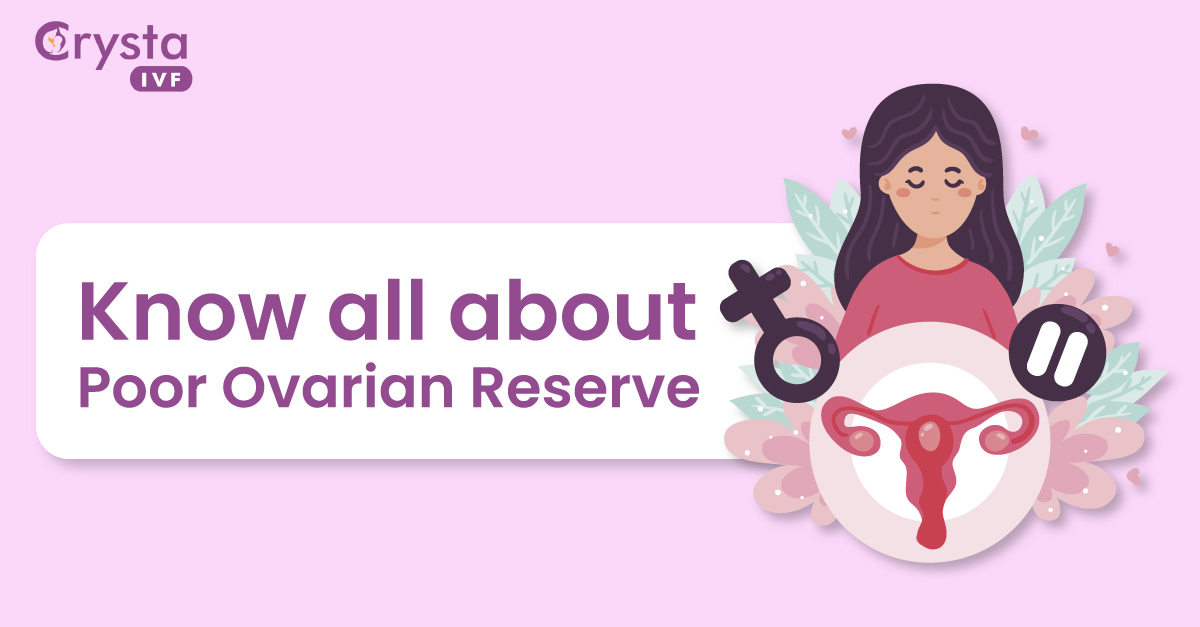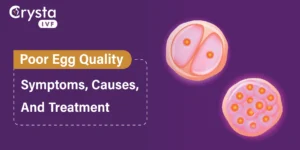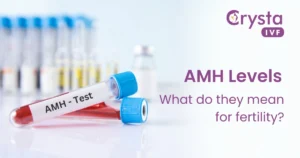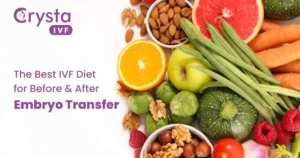Age plays an important role in fertility as well as in egg quality and quantity. The quality and quantity of the ovarian reserve determine the woman’s reproductive potential or her conceiving ability.
Every woman has a certain peak time for reproducing eggs from a young adult until menopause, and the ability of ovulation tends to decrease from puberty until menopause. Thus, fertility declines with age and the quality of eggs too. Fertility or ovarian reserve is highest during the 20s and 30s, but after that, egg quality and quantity also diminish. That’s why an aged woman may take more time to conceive compared to a young woman. And after the age of 37, fertility declines rapidly.
What is a diminished or poor ovarian reserve?
Poor egg quality and quantity is also known as diminished ovarian reserve or DOR, which may cause infertility in women. The main cause of DOR is reproductive aging, but there are many other things that can affect ovarian reserve, including
Pelvic radiation, any reproductive illness, ovarian surgery, genetic abnormalities, chemotherapy, using tobacco in excess; sometimes the cause of DOR is unknown.
With age, there is a greater likelihood of ovulating with poor quality eggs, as well as a greater likelihood of miscarriage. And poor quality fertilized eggs also create problems in implantation and development. It is known that older women tend to have poorer quality eggs, but sometimes the same can happen with younger women.
Ovulating regularly or having regular periods doesn’t mean that any woman has normal or sufficient ovarian reserve. Sometimes it doesn’t happen, and it is a general misconception because a woman can still face challenges in conceiving if the quality of her eggs is low.
Significance of fertility tests
If the couple or partner is unable to get pregnant after one year of trying and the pregnancy doesn’t happen, it means one of the partners is infertile. And this is the only natural way to know about infertility. If so-called infertility happens to any couple, fertility specialists may recommend certain diagnostic tests to confirm infertility on a clinical background.
Hence, fertility tests or ovarian reserve tests are useful tools to assess the chances of conceiving or detecting someone’s fertility potential.
Screening tests for poor ovarian reserve
Ovarian reserve analysis typically includes anti-Mullerian hormone AMH, follicle count, and blood tests. AMH is a hormone produced inside the follicles; its level helps in the estimation of follicles present in the ovaries. During an ultrasound, a doctor can see the activated follicles existing in the visuals of the ovaries. The counting of follicles tells us about the ovarian reserve status. This method is more reliable and accurate compared to the older methods like estradiol, inhibin, and FSH testing methods.
For predicting pregnancy potential or ovarian reserve, there are several tests available. These are estradiol level, FSH (follicle-stimulating hormone) level, AFC (antral follicle count), and AMH (anti-Mullerian hormone) level.
- FSH test: FSH is the hormone that helps in the secretion of estrogen and its levels may vary every month. A high level of FSH shows low ovarian reserve. And it helps in the maturation of and release of eggs during the menstrual cycle.
- Estradiol test: Estradiol level measurement is also required to see the status of ovarian reserve or egg quality during advanced age.
- AMH test: Serum AMH is a better indicator of the ovarian reserve because it is less likely to change than FSH during the menstrual cycle. So at any given time during the whole menstrual cycle, it can be easily checked without fluctuation. Its level shows the quantity of potential eggs present in the follicle. And the level of AMH starts declining as we age, so it becomes easier to know the ovarian functions as well. AMH also plays an important role in IVF treatment; it detects excess or low ovarian function.
- Antral follicle count (AFC) test: An AFC, or antral follicle count, is the total number of eggs present in the ovaries during Sonography. The eggs develop in the small follicles or antral follicles. This test can be used at any time during the whole menstrual cycle, but it can vary each month. And it is one of the useful tests in IVF treatment during egg retrieval time.
- Gonadotropin response test: A hormone known as gonadotropin is given to stimulate egg production for fertility treatment. Pregnancy chances decrease if a woman needs more of this hormone for the stimulation of her ovaries.
Predicting the fertility test results
All the above tests predict a woman’s fertility and give a clear status of her ovarian reserve. Apart from this, these tests work as indicators and are helpful in assessing fertility treatment and its response. Ovarian reserve tests assess the fertility potential of a woman but don’t give any clues as to who will conceive or who won’t. Any one unusual test result among all the tests indicates low fertility potential.
Ovarian reserve is also used to confirm menopause or early menopause, polycystic ovarian syndrome (PCOS), a condition in which the ovaries have follicles but don’t ovulate or release eggs. But ovarian reserve doesn’t tell you anything about the chances of pregnancy in a particular time period.
Difference in egg count and egg quality
While egg count indicates fertility, other factors, such as a woman’s healthy pregnancy, are entirely dependent on egg quality. It means egg quality tells us whether the eggs produced by any female are normal or abnormal. If the eggs are normal, then it will result in a healthy pregnancy, but if the eggs are abnormal or of poor quality, it will lead to miscarriage, genetic abnormalities (down syndrome), or infertility.
How is IVF fertility treatment linked with ovarian reserve?
The success of IVF directly depends on the quantity and quality of eggs. Females with high ovarian reserve respond well to the hormonal medication given to retrieve healthy eggs. Such females also produce more eggs than low-ovarian-reserve females during IVF fertility treatment.
Overview
Hence, here we see how ovarian reserve plays an important role in a woman’s reproductive age and it is an important factor that determines the likelihood of pregnancy. The best way to know more is to take the guidance of a fertility specialist and an endocrinologist available at “Crysta IVF”, a renowned company that offers the best fertility treatment at your convenience.
Contact us today to get a free consultation at www.crystaivf.com and book an appointment.




